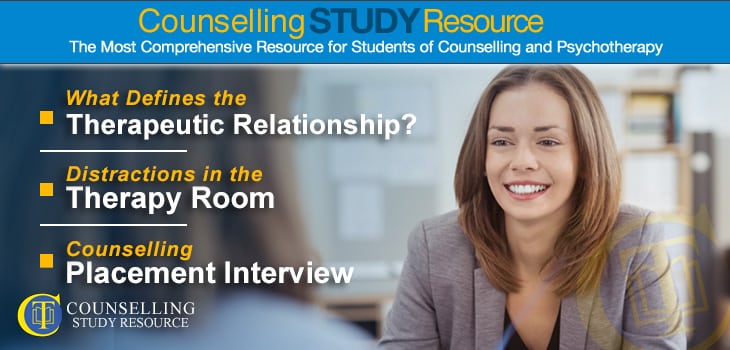105 – Counselling Placement Interview
What Defines the Therapeutic Relationship? – Distractions in the Therapy Room
In episode 105 of the Counselling Tutor Podcast, Ken Kelly and Rory Lees-Oakes talk about important elements of the therapeutic relationship. In ‘Practice Matters’, Rory then covers possible distractions in the therapy room, and how to deal with these. The podcast closes with some pointers on the type of questions you might get asked – and might want to ask yourself – at a counselling placement interview.
What Defines the Therapeutic Relationship? (starts at 2.00 mins)
There are a number of elements that together define the therapeutic relationship. Psychologist Petruska Clarkson developed the five-relationship model, which provides one model for looking at this.
In Rory’s view, the following are some key elements in the therapeutic relationship:
- contracting
- seeing the essence of the client, as described by Martin Buber as having an I–Thou relationship
- understanding transference and countertransference
- modelling stability while being congruently human too, with all our imperfections
- being able to repair fractures in the relationship, e.g. through the use of immediacy
Research has shown that the therapeutic relationship is the single most important fact in the success of therapy. Ken sees the therapeutic relationship as idiosyncratic – in other words, each is unique, and depends on the two people involved and how they connect.
Clarkson’s book The Therapeutic Relationship looks at the uses and abuses of the therapeutic relationship in counselling, psychology, psychotherapy and related fields.
Rory has done a lecture on Clarkson’s model; you can view it here. You can also view the lecture on transference and countertransference, which is highly relevant to the quality of the therapeutic relationship.
Distractions in the Therapy Room (starts at 12.07 mins)
This topic was raised recently in our Facebook group (where you’ll find over 22,000 others involved in the world of counselling and psychotherapy, including students, qualified counsellors, supervisors and tutors).
Rory reflects on his 17 years of clinical practice, recounting a number of distracting experiences he has encountered – from disco music to fire alarms! He provides tips on how best to deal with such distractions, including putting these in the client’s clinical notes, discussing what happened with the client, and keeping a sense of humour.
Counselling Placement Interview Questions (starts at 17.54 mins)
Again, this topic regularly arises in our Facebook group. Even if you are already on placement or have completed this, the tips here may well be relevant to jobs for qualified counsellors too.
You may find you have to participate in both a group interview and an individual interview.
Important areas to think about before your counselling placement interview and to be ready to answer questions on are:
- ethical issues (e.g. whether or not it is OK to touch a client)
- your own personal development
- prejudices you may be aware of in yourself
- confidentiality and the limits to this
- your availability for work
It is a good idea to do some research on the organisation and its specialist area (if relevant) before the interview.
Remember that the interview is not just a one-way process. You have much to offer the agency: students are naturally highly up-to-date with theory and subject to continual observation of their skills.
So do think about what questions you can ask them, for example what support and training they will provide for you and what the counselling rooms are like (you could even ask to look).
If you feel uncomfortable with what you see and hear, then don’t be afraid to look elsewhere. It’s very important that your placement organisation is somewhere you can grow and be nurtured.


